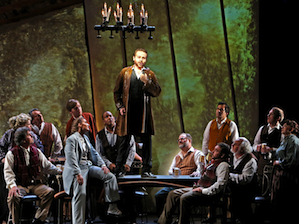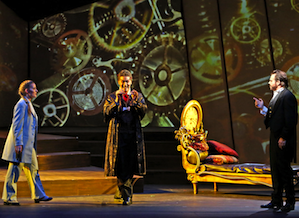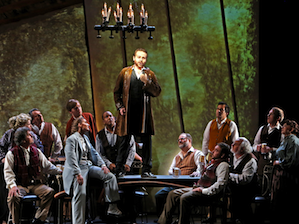
Photos by Otak Jump
The Tales of Hoffmann was produced by West Bay Opera this weekend in Palo Alto’s Lucie Stern Theatre. Jacques Offenbach’s opera is the story of a man who has the misfortune to fall in love with three impossible women: a 19th-century mechanical robot-doll, a terminally ill singer, and a manipulative Venetian courtesan.
At every turn the devil makes sure that things end very badly. In the end, there’s one woman who is the best of all three worlds — she is beautiful, musical, and alluring — but will the devil ruin it yet again for the hero, Hoffmann?
All four women were played by Soprano Rochelle Bard, who was able to switch characters seamlessly. As the robot, she was hilarious and nailed the high notes in the famous automaton aria. As the sad, dying singer she was unrecognizable from before, going from funny to lamenting. Her third metamorphosis was downright frightening: the sweet girl from the previous act was now a malicious femme fatale. Bard’s transformative ability is uncanny — I had to double check the program to make sure that they were all the same woman. Her appearance (kudos to the makeup people and to costume designer Abra Berman) and her acting and singing were adjusted, in each case resulting in an astonishing display of versatility.
By the end Bengochea gave some of the most inspired singing I have heard at West Bay Opera.
Bass-baritone Robert Stafford also played four different characters; here, by contrast, the portrayals were consistent. Ghoulish in appearance, and always butting into the action in a darkly comical way, he made an effective villain, especially given his grim voice. At the other extreme was Bettany Coffland as the muse who keeps Hoffmann alive, but who also seems to feed on his heartache, channeling pain into poetry. As a foil to Stafford’s various evil embodiments, in the guise of Hoffmann’s best friend, she sang with a soft, delicate tone.

In the title role, Christopher Bengochea got off to a slow start on Sunday, but apparently he was saving his stuff for the right moment. Throughout the different scenes in his life he, too, portrayed a transformation from an enthusiastic, naive young man to a love-torn alcoholic. He saved his most passionate voice for the exact moments of heartbreak: the humiliation when he realizes he has fallen in love with a machine (it doesn’t seem so farfetched in this day and age), the moment of his lover’s death, and the time when he finds he’s being used by the courtesan. We in the audience could almost hear the life draining out of him in each of these cases, and we were swept along for the ride. Each ensuing heartbreak would intensify, and by the end Bengochea gave some of the most inspired singing I have heard at West Bay Opera.
The fantastical spirit of Hoffmann’s character is magnified in this production, which is sung in French with English titles, with its bright sets and a very active chorus hell-bent on partying and raising a ruckus. The show was not without glitches, however. A broken bed, a flying conductor’s baton, a few “oopsies” in the pit orchestra, and a cramped auditorium contribute to the “community company” feel of West Bay’s productions. Still, the lively spirit of the show and the quality of the talent, roused by the company’s devoted general director and conductor, José Luis Moscovich, never fails to please the local crowd.

